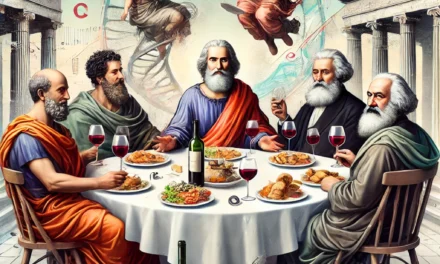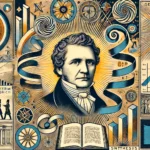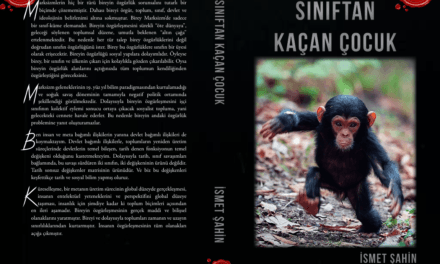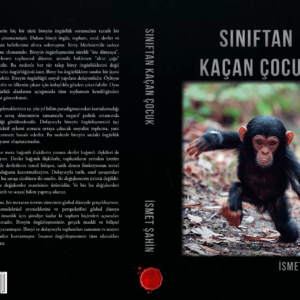
Escaping Class: A Philosophical Critique of Marxism by İsmet Şahin – An Advanced Scientific Critique

Escaping Class: A Philosophical Critique of Marxism by İsmet Şahin – An Advanced Scientific Critique
Abstract
This article provides an advanced, in-depth scholarly analysis of Escaping Class: A Philosophical Critique of Marxism, authored by İsmet Şahin. The book critically re-evaluates Karl Marx’s ideas, post-Marxist traditions, and the interplay of class, politics, and individual freedom. Şahin contends that mainstream Marxism often overshadows the question of personal liberty, focusing instead on collectivist visions and deferred promises of liberation.
This essay situates Escaping Class in the broader field of Marxist studies, discussing the book’s central claims about Marx’s method, the concept of class, and the shortcomings of Soviet, Trotskyist, and Western Marxist experiences. Subsequently, it offers a thorough critique, extending the conversation around historical materialism, dialectical reasoning, and the intricacies of power within socialist experiments.
By engaging contemporary scholarly debates, this essay shows how Şahin’s work challenges both orthodox and heterodox Marxisms, contributing to ongoing discussions on freedom, agency, and the potential for a renewed, less dogmatic approach to social theory.
1. Introduction
Escaping Class: A Philosophical Critique of Marxism (henceforth EC), written by İsmet Şahin, revisits the core assumptions of Marxist thought, particularly how it has been interpreted and politically realized in the past century. EC poses significant questions:
Does Marx’s critique of capitalism necessarily involve a dogmatic form of dialectical materialism?
Is class truly central to Marxist theory?
How do we integrate collective emancipation with personal rights in revolutionary projects?
Although Karl Marx offered a powerful critique of capital—chiefly in Capital (1867–1894)—the 20th-century attempts, from Soviet socialism to Western Marxism, reveal a persistent tension between collectivist goals and individual freedom. Şahin’s leading argument is that mainstream Marxisms—Stalinism, Trotskyism, and some Western Marxist currents—have regularly postponed or subordinated personal liberty in favor
of eventual systemic change. Such deferral, he suggests, parallels a religious teleology,
where ultimate salvation (i.e., freedom) is always relegated to the future.
This critique proceeds in eight sections.
Section 2 outlines the historical and methodological background of Marxist theory.
Section 3 covers Şahin’s reading of Marx’s method, contrasting it with deterministic models.
Section 4 unpacks EC’s treatment of class, criticizing the primacy it has often enjoyed.
Section 5 surveys how Stalinism, Trotskyism, and Western Marxism each fail to address present-day freedoms.
Section 6 highlights the dilemma of postponing individual liberty.
Section 7 extends and critiques Şahin’s arguments.
Finally, Section 8 concludes, mapping potential future avenues for research.
2. Historical and Methodological Background
2.1 Marx’s Legacy and the Emergence of Multiple “Marxisms”
Karl Marx (1818–1883), in foundational works like The Communist Manifesto (1848) and Capital (1867–1894), framed capitalism as a system extracting surplus value from wage labor.[1]
However, Marx never published a conclusive text identified as “dialectical materialism.” Friedrich Engels (1820–1895) took the first steps toward such a universal worldview in
Anti-Dühring (1877) and Dialectics of Nature (1883). Later, Lenin (1870–1924) codified “dialectical materialism” into the Soviet orthodoxy, which would be further crystallized under Joseph Stalin (1878–1953).[2]
Following Lenin’s death, the Soviet Union congealed Marxism–Leninism into a rigid state ideology.
Leon Trotsky (1879–1940) resisted Stalin’s bureaucracy but also believed
revolutionary success could justify restricting present freedoms. Concurrently,
Western Marxism (György Lukács, Antonio Gramsci, Theodor W. Adorno, Max Horkheimer,
Louis Althusser, and others) diverged from Soviet dogmas but rarely resolved the tension between collective aims and personal autonomy.
In Escaping Class, İsmet Şahin contends that none of these tendencies—Soviet,
Trotskyist, or Western—adequately tackled the immediacy of individual liberty. He
suggests that an overemphasis on “dialectical materialism” and “class struggle” inadvertently eclipsed urgent personal freedoms.
2.2 Motivations and Emphases
Authored within Turkey’s vibrant intellectual scene—where socialist thought remains contested—EC represents both personal and theoretical reflections. Şahin critiques how overly deterministic visions of Marxism hamper open inquiry and how a one-sided focus on class ignores broader dimensions like gender, race, or personal freedom.
A key element is returning to Marx’s original texts to identify what he truly wrote
regarding method, determinism, and democracy.[3]
3. Şahin’s Critique of Marx’s Method
3.1 Dialectical Materialism as an Orthodoxy
A major throughline in EC is that Marx did not systematize a dogmatic theory. While Marx often utilized Hegelian dialectics, gleaning what he saw as the “rational kernel,” he never explicitly labelled his approach “dialectical materialism.” Nonetheless, under the Marxism–Leninism of the Soviet era, dialectical materialism was treated as a universal principle.
In Şahin’s view, this shift away from Marx’s fluid methodology to a rigid, cosmic law stifled the spirit of inquiry.[4]
Within the Soviet tradition, dialectics often became a metaphysical absolute,
presumed to govern nature, history, and consciousness. EC warns that this approach
contradicts the materialist notion that knowledge must remain open to new empirical evidence.
Instead, universalized dialectics congeals into dogma, incapable of addressing social
complexities or contingencies.
3.2 Research vs. Presentation
Another key element is how Marx differentiated between the methods of research
(studying real-world complexities) and the method of presentation (systematically reconstructing concepts from abstract to concrete).
In Capital (1867), Marx moves from the commodity form to money and capital, using historical examples alongside conceptual logic. Soviet interpreters, however, often cast these steps as immutable laws. EC thus reiterates that dialectics in Marx was adaptive, not an absolute framework for all reality.
By contrast, dogmatic dialectics can hamper our capacity to integrate novel data
or cross-disciplinary findings (e.g., complexity theory).
4. Rethinking the Concept of Class
4.1 The Many Faces of Class in Marx
EC devotes considerable attention to how Marx employed “class” differently
across his corpus:
- The German Ideology – class linked to the division of labour, and property.
- The Eighteenth Brumaire – political organization is crucial (peasants require
unification to become a class). - The Poverty of Philosophy – class “in itself” vs. class “for itself,” highlighting consciousness.
- Capital, Vol. 3 – class based on surplus extraction (capitalists, landlords, workers).
From these, Şahin concludes that Marx never anchored a single, rigid definition. Instead, “class” is at times an economic category, at other times a political or consciousness-based one.
Hence, slogans like “The history of all hitherto existing society is the history of class struggles”[5] are best read politically, not as a universal scientific law.
4.2 Politicizing Class vs. Scientific Analysis
EC posits that many Marxists conflate Marx’s political calls for class struggle with an
all-purpose historical law. This overshadowing of immediate personal freedoms (and other social contradictions, e.g., gender oppression, race, or national identities) amounts to a form of class reductionism.
Şahin suggests that Marxism should neither discard the class concept nor elevate it to a singular lens. Instead, class must be embedded within a broader, non-dogmatic framework that also recognizes personal autonomy.
5. EC’s Critique of Stalinism, Trotskyism, and Western Marxism
5.1 Stalinism: From Worker Soviets to Bureaucratic Counterrevolution
EC meticulously recounts how early Soviet power (1917–1920s) featured worker
councils (Soviets), factory committees, and trade-union influence. Yet under Stalin’s Five-Year Plans, single-person management, forced labor (e.g., the Gulag system), and the piece-rate wage regime displaced genuine worker control. Simultaneously, the bureaucratic “nomenklatura” accumulated privileges, eclipsing the mass of workers.
Şahin interprets this process as a bureaucratic counterrevolution, subjugating public property to party elites. The discourse of “class interest” justified sweeping repression, including criminalizing dissent and restricting individual mobility via internal passports. In the end, personal freedoms were systematically sacrificed for industrial targets, ironically replicating capitalist exploitation under the banner of socialism.
5.2 Trotskyism: Parallel Paradigm, Different Strategy
Though Leon Trotsky harshly criticized Stalin, EC argues that Trotskyism
still upheld the premise that individual liberties might need curbing under revolutionary duress. Trotsky’s position during the Kronstadt rebellion (1921)—where sailors demanded more democracy—illustrated that he too endorsed suppressing local freedoms in pursuit of an overarching revolutionary goal.
EC sees little difference in principle from Stalin, except in pacing or strategic details.
Hence, the tension between collective aims and personal rights persisted.
5.3 Western Marxism: Negativity Without Immediate Program
Finally, EC surveys Western Marxism, applauding its cultural critiques (e.g., Adorno and Horkheimer’s Dialectic of Enlightenment) but lamenting the absence of a practical route to secure immediate individual freedom. Figures like Herbert Marcuse exposed how advanced capitalism and mass culture dull revolutionary consciousness, but they did not necessarily prescribe direct institutional solutions for personal liberties in the present. Thus, even Western Marxism, with its “negative dialectics,” remained locked in deferral.
6. The Core Issue: Delaying Individual Freedom
6.1 The Logic of Postponement
A unifying theme throughout EC is how each major Marxist tradition defers or subordinates personal liberty to future revolutionary transformations. Şahin likens this to religious eschatology, promising ultimate salvation while ignoring present suffering. In practical contexts, this legitimized repressions (whether in Stalin’s USSR,
Trotsky’s militarization approach, or Western Marxism’s waiting for the “right conditions”).
By foregrounding this postponement logic, EC advances the notion that ignoring
immediate freedom stunts the moral and political credibility of socialist experiments.
Indeed, the repeated pattern of “end justifies means” can devolve into authoritarian or
bureaucratic forms of power, contradicting the emancipatory ethos nominally at Marxism’s core.
6.2 Gaps in Marx Himself
EC does not absolve Marx, observing that he never devised a thorough blueprint for protecting individual rights under socialism. While Marx admired the democratic
Paris Commune (1871) as a fleeting example, his writings do not detail how to safeguard individuals from a post-capitalist state’s potential tyranny. Lenin’s The State and Revolution (1917) initially emphasized worker democracy but soon pivoted to the necessity of central authority amid civil war. Hence, the lineage from Marx through Lenin to Stalin or Trotsky contained no robust solution for ensuring personal autonomy.
7. A Theoretical Critique and Extensions
7.1 Marx’s Coherence vs. Contradictions
EC spotlights contradictions in Marx’s approach. However, scholars such as
Bertell Ollman (Dance of the Dialectic) contend that Marx’s dialectical method is more
internally consistent than it appears.[6] The question remains if those “contradictions”
are inherent in Marx or stem from subsequent readings that turned flexible analyses into rigid formulae.
7.2 Engels’s Role and Overreach
Şahin criticizes Engels for universalizing dialectics, but some historians believe Engels
sought to harmonize contemporary science with dialectics. Soviet thinkers then amplified those claims into dogma. EC might benefit from clarifying Engels’s intentions,
distinguishing them from later Stalinist codifications.
7.3 Class vs. Intersectionality
EC underlines how classical Marxism privileges class over other oppressions. Yet certain Marxist feminists, anti-colonial Marxists, and more intersectional theorists (Rosa Luxemburg, José Carlos Mariátegui, Claudia Jones) did address race, nationalism, or gender in immediate terms. Exploring these expansions might show that not all Marxists reduce everything to class, even if the mainstream tradition tends to do so.
7.4 Revolution, Crisis, and Real Constraints
EC often attributes repressive turns to dogma, but real historical exigencies—civil wars,
foreign threats—cannot be dismissed. Lenin, Trotsky, and Stalin faced existential crises,
which they argued justified restricting freedoms. While that doesn’t excuse brutality,
it adds nuance to the claim that dogmatic theory alone caused repression.
7.5 Varied Western Marxism
EC somewhat flattens Western Marxism as “negative critique.” Figures like Gramsci (hegemony and civil society), Lukács (reification), Marcuse (new sensibility) each differ. A deeper parsing might reveal partial attempts at addressing personal autonomy in everyday life. Nonetheless, the main point stands: Western Marxism seldom offered a robust, immediate emancipatory program.
8. Conclusion and Prospects
İsmet Şahin’s Escaping Class: A Philosophical Critique of Marxism contends that class struggle—combined with an absolutized dialectical materialism—has systematically deferred personal freedoms in 20th-century socialist projects. By revisiting Marx, Şahin argues that the latter never intended a rigid cosmic law; subsequent interpreters (Engels, Lenin, Stalin, Trotsky, Western Marxists) each, in different ways, postponed individual liberty in favour of future revolutionary success.
In today’s left discourses—where bridging structural critique and personal emancipation remains key—EC’s account is highly salient. Şahin’s main thesis is that deferring freedom inadvertently invites bureaucratic or authoritarian tendencies, diminishing both the ethical and strategic integrity of socialist movements. This echoes calls from council communists, libertarian socialists, and intersectional feminists who prize immediate autonomy rather than waiting for post-revolutionary conditions.
Future scholarship may enlarge upon EC by forging a flexible, contemporary scientific approach that rejects teleology, fosters an intersectional lens, and re-examines Marx’s lesser-known texts on communal or non-Western societies. Likewise, examining real-world experiments could yield practical insights on balancing personal freedom with collective aims.
Ultimately, Escaping Class articulates a vital reminder: emancipation cannot be an exclusively future promise. An authentically liberatory Marxism must incorporate and safeguard individual freedom here and now, not merely as an afterthought once class victory is supposedly assured.
References
- Marx, Karl.
The Communist Manifesto (with Friedrich Engels, 1848).
Capital (1867–1894). - Engels, Friedrich.
Anti-Dühring (1877); Dialectics of Nature (1883). - Lenin, Vladimir I.
Materialism and Empirio-Criticism (1909);
State and Revolution (1917). - Trotsky, Leon.
History of the Russian Revolution (1930);
The Revolution Betrayed (1937). - Stalin, Joseph.
Foundations of Leninism (1924). - Western Marxism:
Lukács, Georg. History and Class Consciousness (1923);
Gramsci, Antonio. Prison Notebooks (1929–1935);
Adorno, Theodor W. & Horkheimer, Max. Dialectic of Enlightenment (1947);
Marcuse, Herbert. Eros and Civilization (1955), One-Dimensional Man (1964). - Secondary Analyses:
Thompson, E.P. The Making of the English Working Class (1963).
Ollman, Bertell. Dance of the Dialectic: Steps in Marx’s Method (2003).
Fitzpatrick, Sheila. The Russian Revolution (1982).
Getty, J. Arch & Naumov, Oleg V. The Road to Terror: Stalin and the Self-Destruction of the Bolsheviks, 1932–1939 (1999). - Şahin, İsmet.
Escaping Class: A Philosophical Critique of Marxism.
(Central text under discussion in this review, offering a critical, philosophical, and methodological
analysis of Marxist theory with emphasis on individual freedoms.) - Notes:
[1] In Capital, Vol. 1, Marx details how capitalist profit arises from surplus value
created by wage labor.
[2] See Engels’s expansions in Anti-Dühring and Dialectics of Nature.
The Soviet state turned these into a universally applied “world outlook.”
[3] Praksis, a Turkish journal, has long debated such methodological concerns.
[4] Althusser’s critique of theoreticism also condemns universal “dialectics” as a metaphysical dogma.
[5] Marx & Engels, The Communist Manifesto, 1848, ch. 1.
[6] Ollman, Bertell. Dance of the Dialectic, 2003.
Review
93%
Summary This article provides an advanced, in-depth scholarly analysis of Escaping Class: A Philosophical Critique of Marxism, authored by İsmet Şahin. The book critically re-evaluates Karl Marx’s ideas, post-Marxist traditions, and the interplay of class, politics, and individual freedom. Şahin contends that mainstream Marxism often overshadows the question of personal liberty, focusing instead on collectivist visions and deferred promises of liberation.





























RECENT COMMENTS